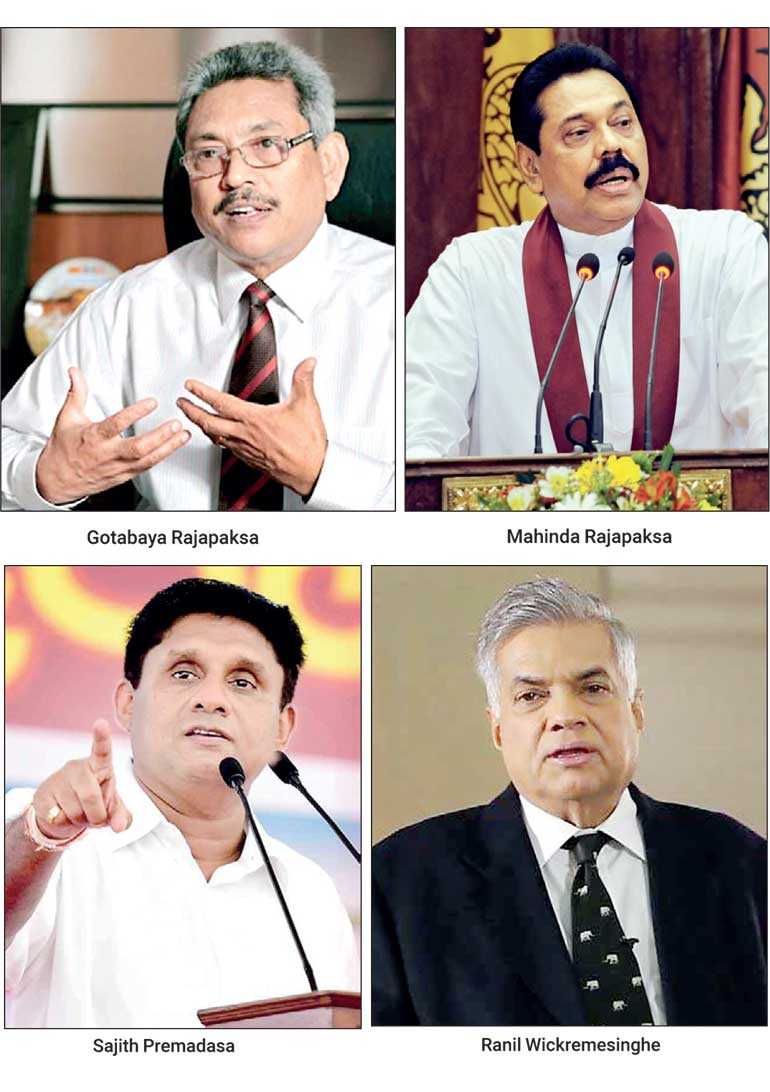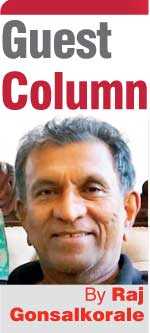Tuesday Feb 17, 2026
Tuesday Feb 17, 2026
Monday, 7 October 2019 08:04 - - {{hitsCtrl.values.hits}}

Unless someone throws a last minute grenade, Gotabaya Rajapaksa will head the favourite spot for the presidency along with Sajith Premadasa on 16 November.
Several also-rans and a couple of others, whose preferences could become pivotal for Gotabaya or Sajith to win the presidency, are also out in the field in their running shorts and sarongs. No doubt such contenders and “kingmakers” behind them will strike all kinds of deals with both major contenders between now and 16 November. Both of course will deny they have made such deals.
In the ideal world, it’ll be far better for the country and its future if one or the other major contenders wins the presidency outright without having to be beholden to kingmakers or queenmakers. The voters will have to make that decision and one can only hope they will make a decision best suited for the future of the country.
In Gotabaya, voters have a contender who has proven his ability to solve issues, albeit, at times, in forceful ways, that could have, and have led to, questioning of his methods. He is of course known as a man who gets things done. His role in the campaign against the LTTE is well known and the country is free of terrorism thanks to him and others like former Army Commander Sarath Fonseka and many other Armed Forces and Police personnel, along with the man who gave the political leadership, former President Mahinda Rajapaksa.
Many appear to be of the view that the country needs a leader like Gotabaya Rajapaksa to lift it from the economic doldrums it is in, and the uncertainty about the security of its people consequent to the Easter Sunday bombings.
In Sajith, the country has a relative unknown when it comes to his ability to solve issues and get things done. Even very close supporters will find it difficult to pinpoint specific achievements which could give confidence to the voters that he will be a capable leader, if one were to make that judgement based on past achievements, as there are hardly any.
However, Sajith has to be given credit for his dogged pursuit of the UNP candidacy and his battling almost the entirety of the party heavyweights including the Prime Minister and the Party Leader Ranil Wickremesinghe who till the last moment battled to be the candidate. It is an absolutely pathetic and facile statement Wickremesinghe has made that he “groomed a young set of leaders”, when he has done no such thing.
This article however is not a critique or an endorsement of either candidate, but a look at some issues of relevance that could be considered important whoever wins the presidency.
Powers of the presidency
Firstly, the question of why either person wants to be the president when what the winner will get is a much watered down version of the presidency compared to the presidency prior to the 19th Amendment.
The 19th Amendment shifted most of the real powers of the presidency to the prime minister, the cabinet and the Parliament. The president is now answerable to the Parliament. While the pre-19th Amendment presidency had almost absolute powers, the post-19th Amendment presidency has only a few residual powers specific to some defined areas.
The president has the constitutional power to make the Statement of Government Policy in Parliament at the commencement of each session of Parliament. However, implementing such a policy statement becomes the responsibility of the cabinet of ministers and the Parliament. The president is the head of the cabinet as per the constitution. Unless the President is able to secure the support of the rest of the cabinet, whatever he/she as president may have stated in the Policy Statement will not get implemented.
One can appear to be powerful when one is clearly not. The current presidency is a good example of a peacock syndrome and how wasteful it can be for the country in terms of advancement to the future when two power centres, one which really do not have effective powers and the other which has them, attempts to government country.
Constitutional experts may be able to shed more light on this duality of power sharing, and how it might work for the benefit of the country, but a layman will find it difficult to see how this could be done unless the president, more as a member of the cabinet rather than just as president, is able to work closely with the prime minister and the rest of the cabinet and the Parliament.
The bull, the buffalo and the plough
In this scenario, it will be impossible for the country to be stable and prosper unless both the president and the prime minister moves together in the same direction along with a team of ministers and a supportive Parliament. Former President Mahinda Rajapaksa aptly said “one cannot plough a field with a bull and buffalo tied to the plough” when he referred to what the country has been experiencing since 2015.
If the 2019 election produces an outcome that is similar to what the country has had since 2015, there is no doubt it will go back many years, and the economy, social wellbeing and cohesion, the security of the nation, will all take further beatings bringing in unrest and instability.
So, it is well worth examining who will be ploughing the field should one or the other becomes the president.
If Sajith Premadasa is the winner, who then will be the prime minister? The current Prime Minister has made it known beyond any doubt that he wants to be the prime minister although his becoming that will really be up to the UNP rather than a President Premadasa. The next question then is, if he does succeed in becoming the prime minister, will there be two power centres or who will bend to the will (some say the cunning and machinations) of the other?
Most tend to agree that relative to the other, Sajith Premadasa is not cunning and engaging in behind-the-scene machinations as Ranil Wickremesinghe. The issue then is whether Sajith Premadasa will bend to the will of Ranil Wickremesinghe and his supporters or whether he will also act like the bull in the plough along with the buffalo, similar to what the country has experienced in recent times.
It is a well-known fact that Ranil Wickremesinghe fought to the bitter end to secure the presidential nomination for himself with the hope that he would have a compliant “yes” man or woman as his prime minister. Wickremesinghe has said on many occasions that his singularly important ambition in life is to be in power and wield power.
A Premadasa-Wickremesinghe government will not bring stability and economic progress unless Sajith Premadasa plays second fiddle to Ranil Wickremesinghe. This surely is the reality from a constitutional and practical point of view. The big question is whether Premadasa is willing and be able to play second fiddle in a divided party.
Voters should ask themselves whether this is what they wish for the country. It would be well worth it and necessary for the UNP to decide who they will nominate as the prime minister as the Presidential Election is not just about the president. This would give a clearer picture as to the nature and stability of a future government with Premadasa as the president.
Should Gotabaya Rajapaksa win, the position of a future government is much clearer. As stated openly, Mahinda Rajapaksa will be the prime minister unless he chooses another to be that. The country wide popularity of Mahinda Rajapaksa is a reality that is accepted publicly and privately by supporters and opponents. His power within the SLPP and beyond is undisputed.
Whether one agrees or disagrees on a sibling candidacy, the reality is that Mahinda Rajapaksa will be the constitutional and real power in a Gotabaya Rajapaksa presidency. Voters could look back to the pre-2015 period and see how this combine worked although Gotabaya was not a minister then.
However, it is common knowledge that he was more powerful than the ministers at the time as he had the ear and direct support of the President. Voters should look at the achievements of that government while they critique the negatives of that government and make a judgement based on an assessment of the strengths and weaknesses of that government.
Voters will then have to ask themselves whether such a combination will be better for the country than a Premadasa-Wickremesinghe combine. Their ability to work together and their record of working cooperatively with each other. One shouldn’t forget that Premadasa was on the cusp of challenging Ranil Wickremesinghe for the party leadership some years ago, and backed down only when pressured to do so by party higher-ups. Their rivalry is nothing new and it persists to this day.
Besides these political imperatives, there are many other key issues that should be addressed by both major contenders. No doubt the stance and policies on the future direction of the economy, education, health, social cohesion and several others will hopefully be discussed and debated in the coming weeks.
Foreign policy
Foreign policy is one such significant issue that should be addressed, and within this, a key question that should be answered by both major contenders is how they will respond to the incursions into the country that were being worked behind the scenes by a major world super power, which apparently have been put on hold temporarily.
The future of the Millennium Agreement, SOFA and ACSA and how the two major contenders will handle these needs to be known to the voters. As far as this writer is aware, both contenders have been silent and their silence has been deafening.
The country’s foreign policy is the singularly most important determinant of its economic policy, and everything else. Sri Lanka is in a way in an axis, some would say an axil of disaster sovereignty wise, being hemmed in between China, India and the USA, while others would say the country is in an axis of opportunity. Sri Lanka is no doubt caught between a rock and hard place.
As argued by this writer on prior occasions, Sri Lanka should consider a foreign policy that is based on a tri nation compact that includes Sri Lanka, China and India. Sri Lanka’s future prosperity lies in an efficient and effective chartering of its foreign policy and staying clear as far as possible from being caught between super power rivalry between the USA and China. In this respect, developing even a better relationship with India which is closer to the USA than China, and therefore able to balance US concerns about Sri Lanka’s friendship and links to China would be a better option than allowing direct US incursions into Sri Lanka. Such incursions will, without doubt increase US/China tensions within Sri Lanka and will also impact on its relationship with India.
Voters must know the stance of the two main presidential contenders on Sri Lanka’s foreign policy as it is at the heart of its economic policy. What is needed are not motherhood statements but specifics.